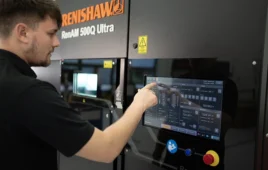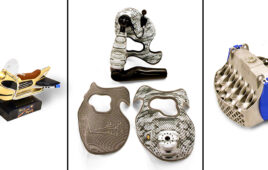Desktop Metal announced it has qualified the use of nickel alloy IN625 (IN625) for the Production System platform, which leverages patent pending Single Pass Jetting (SPJ) technology designed to achieve the fastest build speeds in the metal additive manufacturing industry.
A nickel-chromium superalloy, IN625 is characterized by its high strength, resistance to corrosion and oxidation, excellent weldability, and ability to withstand extreme, elevated temperatures for parts under load. IN625 is used extensively in high temperature aerospace applications, while its corrosion resistance under a range of temperatures and pressures also makes it an excellent choice across marine, power generation, and chemical processing applications.
Key Applications
Desktop Metal’s materials science team has qualified and fully characterized IN625 printed on Production System technology in accordance with ASTM testing requirements. IN625 parts printed on the Production System platform not only eliminate the use of tooling and minimize material waste, but also represent a significant decrease in production time and part cost compared to conventional manufacturing methods.
Examples of key use cases include:
• Hydraulic Spool
Hydraulic spools are a key oil & gas application that assist in adjusting the flow rates of control valves. IN625 is an essential material for these spools to ensure longevity and withstand highly corrosive environments in oil & gas. When produced using traditional manufacturing methods, the spool must typically be assembled from several machined components. With Production System technology, each hydraulic spool can be consolidated and printed as a single part instead of multiple components, significantly reducing the assembly labor costs as thousands can be printed at once with no user input.
• Turbine Blade
Turbine blades are critical components used in gas or steam turbines in the aerospace industry. These blades are some of the most challenging components to mass produce due to their complex geometries, including organic curves that optimize aerodynamics, and complex cooling channels that ensure the blades maintain an optimal temperature. The Production System enables 3D printing of such geometries, which would otherwise be challenging to produce using traditional manufacturing methods and require advanced casting and machining techniques. IN625 is an ideal material for these blades because of its high tensile, creep, and rupture strength, fatigue and thermal-fatigue strength, and corrosion resistance.
• Valve Plug
Valve plugs are used for regulating highly-corrosive fluids in chemical processing environments, where corrosion resistance under a range of temperatures makes IN625 an excellent material choice. Traditionally, these parts would be produced using casting followed by a post-machining step for critical dimensions. Since IN625 is a difficult material to machine and the part has complex geometries with organic curves, the conventional manufacturing process would be very expensive with long tooling lead times. In addition, the Production System enables on-demand production of valves in numerous configurations, without the need for a unique, expensive casting tool for each configuration, greatly reducing production costs.
• Internal Combustion Block
Internal combustion blocks used in aircraft engines often feature extremely complex geometries that are outside the ability of most machine shops and require multiple machining setups and advanced CAM programming. With the Production System, this part can be printed to near net shape without the need for any tooling, and the critical internal dimensions can be touched up in just a few hours with minimal machining setups needed. In addition, because this part experiences extremely high forces and temperatures during the combustion stage, IN625 is an ideal material choice for its incredible material properties in these environments.
• Four-Way Valve Housing
Valve bodies used in power plants to process corrosive fluids often feature complex internal features, making them difficult or impossible to manufacture as single components using conventional manufacturing processes. IN625 is a critical material for these housings because of its durability and corrosion resistance. Binder jetting this component using Production System SPJ technology enables assembly consolidation, reducing the part count, assembly labor time, and cost to produce the housing.
In addition to IN625, the materials library for the Production System includes 17-4PH stainless steel, 316L stainless steel, and 4140 low-alloy steel, each of which have been qualified by Desktop Metal. The platform also supports several customer-qualified materials, including silver and gold, and Desktop Metal plans to add additional metals to its portfolio, including tool steels, stainless steels, superalloys, copper, and more.
Desktop Metal
www.desktopmetal.com
Filed Under: Make Parts Fast




